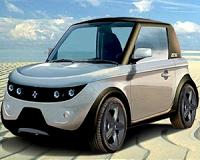 |
Dubendorf, Switizerland (SPX) Sep 02, 2010 It is not an easy task to compare the environmental effects of battery powered cars to those caused by conventionally fuelled automobiles. The degree to which manufacture, usage and disposal of the batteries used to store the necessary electrical energy are detrimental to the environment is not exactly known. Now, for the first time, a team of Empa scientists have made a detailed life cycle assessment (LCA) or ecobalance of lithium-ion (Li-ion) batteries, in particular the chemically improved (i.e. more environmentally friendly) version of the ones most frequently used in electric vehicles. The investigation shows that if the power used to charge the battery is not derived from purely hydroelectric sources, then it is primarily the operation of the electric car, which has an environmental impact, exactly as is the case with conventionally fuelled automobiles. The size of the environmental footprint depends on which sources of power are used to "fuel" the e-mobile. The Li-ion battery itself has, in contrast, a limited effect on the LCA of the electric vehicle. This is contrary to initial expectations that the manufacture of the batteries could negate the advantages of the electric drive.
The environmental impact of batteries for electric vehicles Li-ion batteries are also basically maintenance-free, display no memory effect (loss of capacity when repeatedly charged after partial discharge), have a low self-discharge rate and are regarded as safe and long-lived. For these reasons they find use in many products such as laptop computers. But are they also environmentally friendly? Researchers at Empa's "Technology and Society Laboratory" decided to find out for sure. They calculated the ecological footprints of electric cars fitted with Li-ion batteries, taking into account all possible relevant factors, from those associated with the production of individual parts all the way through to the scrapping of the vehicle and the disposal of the remains, including the operation of the vehicle during its lifetime. Data with which to evaluate the rechargeable batteries was not available and had to be obtained specifically for this purpose. In doing so the researchers made intentionally unfavorable assumptions. One such was to ignore the fact that after use in a car, a battery might well be used in a stationary setting for other purposes. Other relevant LCA information was obtained from the "ecoinvent" database (www.ecoinvent.org), managed by Empa. The electric vehicles evaluated were equivalent in size and performance to a VW Golf, and the power used to charge the batteries was assumed to be derived from sources representing an average European electricity mix. A new petrol-engined car, meeting the Euro 5 emission regulations, was used for comparison. It consumes on average 5.2 liter per 100 kilometers when put through the New European Driving Cycle (NEDC), a value significantly lower than the European average. In this respect, therefore, the conventional vehicle belongs to the best of its class on the market.
More a question of the power source rather than the battery Half of this figure, that is about 7.5 per cent of the total environmental burden, occurs during the refining and manufacture of the battery's raw materials, copper and aluminium. The production of the lithium, in the other hand, is responsible for only 2.3 per cent of the total. "Lithium-ion rechargeable batteries are not as bad as previously assumed," according to Dominic Notter, coauthor of the study which has just been published in the scientific journal "Environmental Science and Technology". The outlook is not as rosy when one looks at the operation of an electric vehicle over an expected lifetime of 150'000 kilometers. The greatest ecological impact is caused by the regular recharging of the battery, that is, the "fuel" of the e-car. "Refueling" with electricity sourced from a mixture of atomic, coal-fired and hydroelectric power stations, as is usual in Europe, results in three times as much pollution as from the Li-ion battery alone. It is therefore worth considering alternative power sources: If the electricity is generated exclusively by coal-fired power stations, the ecobalance worsens by another 13 per cent. If, on the other hand, the power is purely hydroelectric, then this figure improves by no less than 40 per cent. The conclusion drawn by the Empa team: a petrol-engined car must consume between three and four liters per 100 kilometers (or about 70 mpg) in order to be as environmentally friendly as the e-car studied, powered with Li-ion batteries and charged with a typical European electricity mix.
Share This Article With Planet Earth
Related Links Swiss Federal Laboratories for Materials Science and Technology (EMPA) Car Technology at SpaceMart.com
 Italian electric car to go on sale in U.K.
Italian electric car to go on sale in U.K.London (UPI) Sep 1, 2010 A British retailer of electric vehicles says it will start selling an Italian-made two-seat electric car in its showrooms this month. EV Stores - which sells electric cars, bikes and scooters - says the Tazzari Zero will go on sale for about $33,000 Sept. 12, BusinessGreen.com reported Wednesday. he Zero uses rechargeable lithium-ion batteries and can go about 85 miles between ... read more |
|
| The content herein, unless otherwise known to be public domain, are Copyright 1995-2010 - SpaceDaily. AFP and UPI Wire Stories are copyright Agence France-Presse and United Press International. ESA Portal Reports are copyright European Space Agency. All NASA sourced material is public domain. Additional copyrights may apply in whole or part to other bona fide parties. Advertising does not imply endorsement,agreement or approval of any opinions, statements or information provided by SpaceDaily on any Web page published or hosted by SpaceDaily. Privacy Statement |